Florian Arbenz Conversation 5
Florian Arbenz Conversation 5
Florian Arbenz drums, compositions | Joāo Barradas (accord) | Tineke Postma (sax), Rafael Jerjen (b) – Release 29.April 2022
Die Vorgabe ist ambitioniert: Florian Arbenz, kommunikativer wie ideenreicher Drummer aus der Schweiz, ausgezeichnet u.a. mit dem Europäischen Förderpreis für junge Künstler 2000, legt aus der Reihe Conversations die Auflage #5 vor und nennt sie im Untertitel ELEMENTAL – insgesamt entsteht ein Opus Magnum mit Zwölf solcher Gesprächstermine, eine Konversation aufregender als die andere – dabei immer leichtfüßig im wahrsten Sinn einer Bassdrum, Florian Arbenz treibt das Werk unermüdlich voran.
Für die fünfte Folge dieser Konversationsreihe steigt er mit der niederländischen Saxophonistin Tineke Postma, dem portugiesischen Akkordeonvirtuosen Joāo Barradas und dem schweizerisch-australischen Bassisten Rafael Jerjen in den Ring, und legt einen phänomenalen Schlagabtausch vor, voller Überraschungen und in den Erzählungen mehrfach les- und deutbar.
Hat man sich erst auf die Aufnahme eingelassen, kann sie nicht mehr beiseite gelegt werden, so vieles entdeckt sich bei jedem Hören neu.
Da sind zum einen die Ruhephasen, da mal Schlagzeug sich mit Saxophon unterhält, vom Bass unterlaufen oder getrieben, dazwischen wieder und wieder die ganze Wucht des Akkordeons, um schließlich wie auf einer Schnellstraße mit höchstem Tempo vorzupreschen, eine wunderbare Mischung aus leisen, zurückgehaltenen und kräftigen wie expressiven Tönen, das alles in höchster Spielfreude auf höchstem Niveau, du befürchtest gleich auch, aus der Bahn geworfen zu werden – weil du dem staunend beiwohnst und schwindelig gespielt wirst.
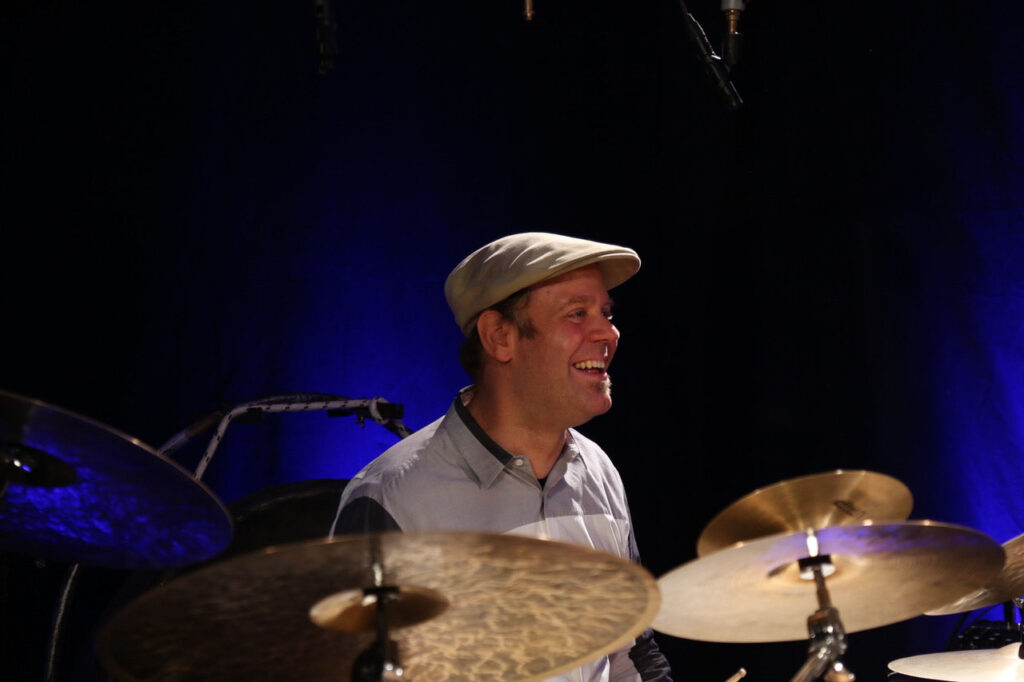
Zu den bislang vorliegenden Conversation #1 #2+3 und #4 gibt es für #1 und #4 jeweils Wikipedia- Einträge: Conversations #1 für Conversation #4 und da Verhoovensjazz längst infiziert ist von diesem Werk mit den so unterschiedlichen Musikern und Musikerinnen, lässt es sich kaum objektiv einschätzen oder beurteilen, das scheint auch nicht mehr nötig. Es ist dies ein Opus, das seinesgleichen sucht und von mal zu mal aufregender zu werden scheint.
Es werden Grenzen getestet, auf höchstem Niveau, der Raum zwischen Studio- und Kammermusik vergrößert sich, wird aufgeweitet, jedes einzelne Stück bekommt Bedeutung, manche Arrangements scheinen einfach aufgebaut, schon passiert, was immer passiert, wenn du etwas Vorhersagbares oder Bekanntes vermutest: Umkehrschub, Kehrtwende und Veränderung. Ein Treiben, ein Pressen, ein Drücken. Ein Fordern und wieder Zurücknehmen. Manchmal wie im Auge des Orkans. Manchmal so zurückgenommen, als wärest du selbst Teil eines Tagtraums am Rhein.
Sie verstehen sich, sie treiben sich, sie üben den Smalltalk, sie tanzen Tango, sie weichen aus, finden sich, die Gespräche sind für den Moment ihrer Unterhaltung das Höchste der Gefühle, das Wichtigste und das Triftigste überhaupt, und kaum hat jemand etwas bekannt gegeben, was schon Gehörtem ähnelt oder Konvention sein könnte, drehen sich alle weg und streben woanders hin. Trommelwirbel: Hiergeblieben. Saxophon: rufend. Akkordeon impulsiv bis besänftigend: wie in Reverie, französisch: Träumerei oder Tagtraum. Geschichtenerzählen, bis tief in die Nacht.
Und gleich wieder diese Hektik. In waking with a start. Was ein Tempo sich da Bass und Schlagzeug vorgenommen haben, und darüber die hohen Töne von Saxophon und Akkorden. Ja, da ist wohl ein Traum geplatzt, los geht’s. Und wie!
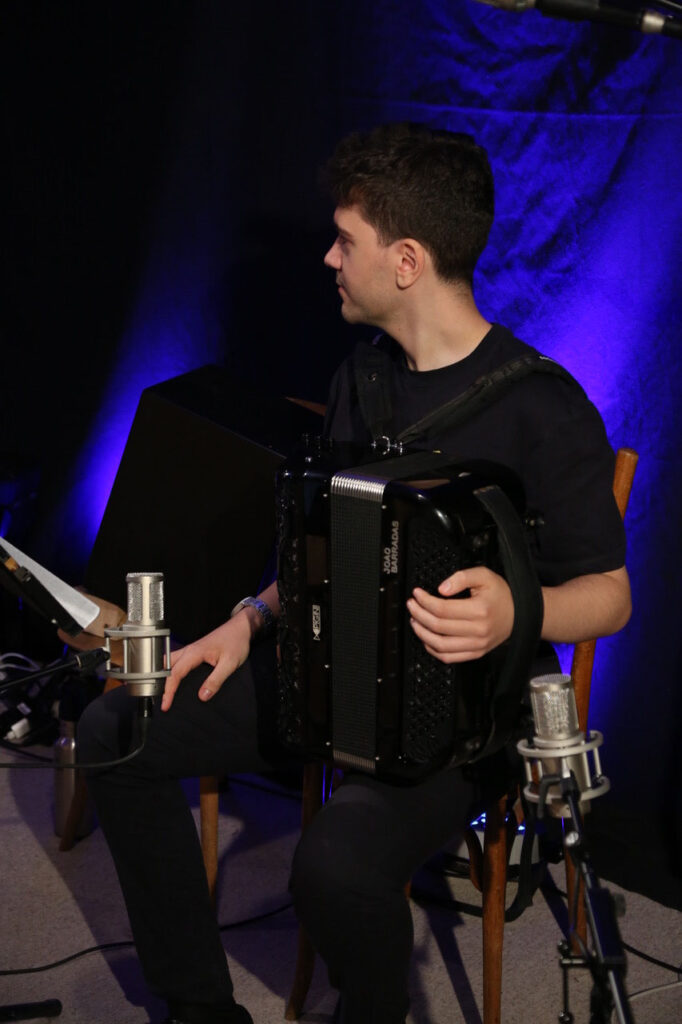
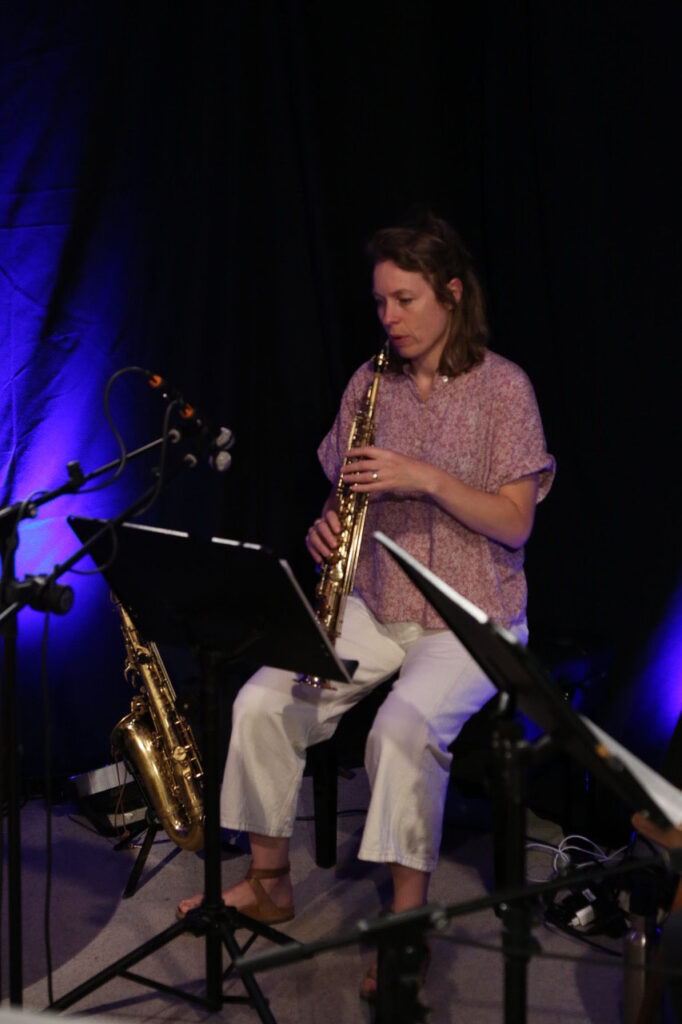
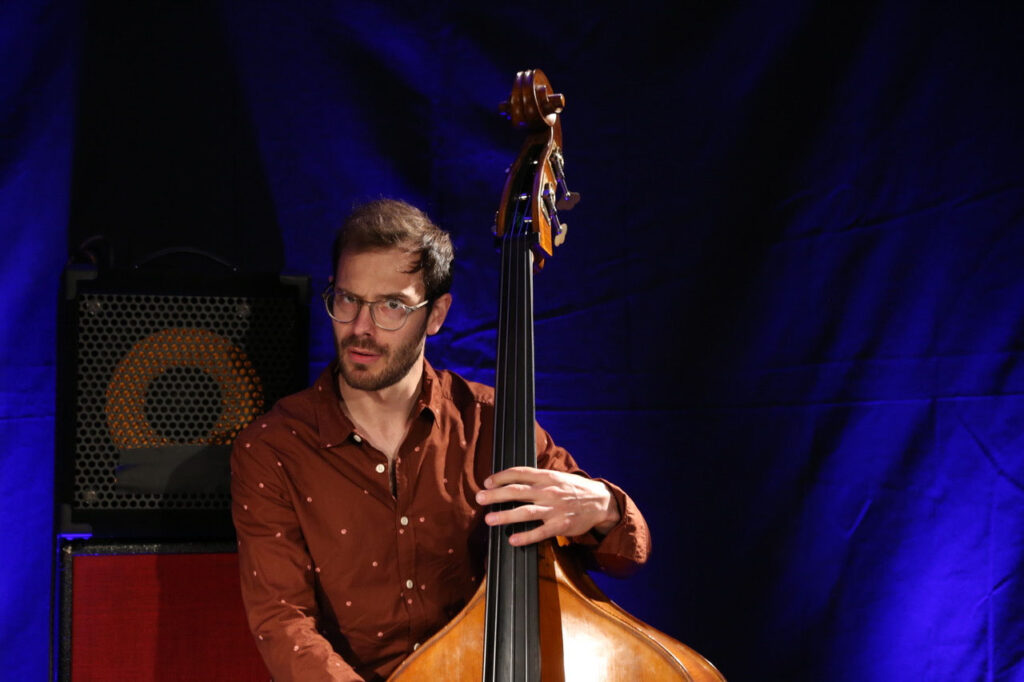
Nach diesem harten Trip, stell dir vor, du wirst so aus allen Tagträumen geweckt – nun. Es gibt auch wieder Ruhemomente. In Luna Volver, ein Carlos Gardel Song, aus dem Spanischen: Mondrücken, der Rücken des Mondscheins – da all das sich setzen darf. Um in Shooting Breeze endgültig von der Leine gelassen zu werden, und ab geht’s.
Was bei allen Conversation-Aufnahmen überzeugt: das Miteinander, das Umeinander, das Unverwechselbare jeder einzelnen Stimme! Das erzeugt ein größeres Ganzes, und wenn du glaubst, dass man sich nur zusammensetzen muss, um solche Aufnahmen zu erzeugen, hörst du trotzdem heraus, dass die Zusammensetzung der Teams nicht willkürlich erfolgt, sondern einer Idee folgt, da der Diskurs nicht ausufern soll, sondern Spielfreude untereinander freisetzen. Es scheint im Vorfeld antizipiert, wer mit wem und was, das Arrangement erzeugt die innere Verbindung, auch wenn sie sich assoziativ gibt, da man viel lieber spielt als redet.
Auch hier wieder: es ergibt sich ein Sound zwischen ausgefeiltem und offenem oder assoziativ freiem Spiel, das Zusammenhalten dieser Welten gelingt ohne Mühe, so scheint es, da Florian Arbenz am Schlagwerk über eine große Bandbreite an Texturen und Erzählmöglichkeiten verfügt, und jeden Ausbruchsversuch wieder unter Kontrolle zu bringen weiß, in allen Wechseln von schnell zu eng, von extrovertiert zu introvertiert, vom virtuosen Saxophonspiel hier, dem melancholischen Passagen dichter Akkordeonharmonien dort, Arbenz weiß es immer zu begleiten, zu führen, es loszulassen, es zu verlangsamen oder zu vertiefen.
Abschluss des Albums bildet Eddie Harris mit Freedom Jazz Dance – den Song kennen wir schon von Conversation #4. Im Vergleich. Hier Saxophon, Akkordeon, Bass, Schlagzeug – dort: Schlagzeug, Bass und Saxophon – ein Song, zwei Welten, endlos viele Spielarten. Von denen es hoffentlich bald wieder Neues zu hören und zu berichten geben wird, auf Conversation #6

Referenzen Florian Arbenz Conversation 5 * :
Mark Corroto in Allaboutjazz zu Conversation #4 | The Free Jazz Collective | Jazz in Europe | Jazzfuel | Jazzviews | Downbeat
Florian Arbenz drums, compositions | Joāo Barradas (accord) | Tineke Postma (sax), Rafael Jerjen (b) – Release 29.April 2022
Siehe auch: Conversation #1 | Conversation #2 und #3 | Conversation # 4
English Version Florian Arbenz Conversation 5 * :
The target is ambitious: Florian Arbenz, a communicative and imaginative drummer from Switzerland who has been awarded the European Young Artists Award 2000, presents edition #5 of the Conversations series and calls it ELEMENTAL in the subtitle – all in all, an opus magnum wants to bee created with twelve such conversations, one more exciting than the other – always light-footed in the truest sense of a bass drum, Florian Arbenz tirelessly drives the work forward.
For the fifth instalment of this conversation series, he steps into the ring with Dutch saxophonist Tineke Postma, Portuguese accordion virtuoso Joāo Barradas and Swiss-Australian bassist Rafael Jerjen, and presents a phenomenal exchange of blows, full of surprises and capable of multiple readings and interpretations in the narratives.
Once you get involved with the recording, you can’t put it aside, so much is discovered anew with every listen.
On the one hand, there are the quiet phases, where the drums talk to the saxophone, undercut or driven by the bass, in between again and again the whole force of the accordion, to finally rush forward at the highest speed as if on an motorway, a wonderful mixture of quiet, restrained and powerful as well as expressive tones, all of this in the highest joy of playing at the highest level, you are also immediately afraid of being thrown off track – because you are amazed and dizzily played.
There are Wikipedia entries for both Conversations #1, #2+3 and #4: Conversations #1 for Conversation #4 and since Verhoovensjazz has long since been infected by this work with such different musicians, it is hardly possible to objectively assess or judge it, and that no longer seems necessary. This is an opus that is unparalleled and seems to become more exciting from time to time.
Boundaries are tested, at the highest level, the space between studio and chamber music expands, is widened, each individual piece takes on meaning, some arrangements seem simply built up, already what always happens when you suspect something predictable or familiar: reversal, turnaround and change. A driving, a pressing, a pushing. A demanding and then a taking back. Sometimes as if in the eye of the hurricane. Sometimes so withdrawn, as if you yourself were part of a daydream on the Rhine.
They understand each other, they drift, they practise small talk, they tango, they dodge, they find each other, the conversations are for the moment of their conversation the highest of feelings, the most important and the most trivial thing of all, and no sooner has someone announced something that resembles what has already been heard or could be convention than everyone turns away and strives elsewhere. Drum roll: staying here. Saxophone: plaintive. Accordion impulsive to soothing: as in reverie, French: reverie or daydream. Storytelling, deep into the night.
And immediately this hectic pace again. In waking with a start. What a tempo the bass and drums have set themselves, and above them the high notes of saxophone and chords. Yes, a dream has burst, here we go. And how!
After this hard trip, imagine being woken up from all daydreams like this – well. There are also moments of peace again. In Luna Volver, a Carlos Gardel song, from the Spanish: Moonback, the back of the moonlight – as all this is allowed to settle. To be finally let off the leash in Shooting Breeze, and off we go.
What is convincing in all Conversation recordings: the togetherness, the distinctiveness of each individual voice! This creates a greater whole, and if you think that you only have to get together to create such recordings, you can still hear that the composition of the teams is not done arbitrarily, but follows an idea, because the discourse is not supposed to get out of hand, but to release playfulness among each other. It seems to be anticipated in advance who with whom and what, the arrangement creates the inner connection, even if it is associative, since one much prefers to play than to talk.
Again: there is a sound between the polished and the open or associatively free playing, the holding together of these worlds succeeds without effort, it seems, because Florian Arbenz on percussion has a wide range of textures and narrative possibilities at his disposal, and knows how to bring any attempt to break out again under control, in all the changes from fast to tight, from extroverted to introverted, from virtuoso saxophone playing here, melancholic passages of dense accordion harmonies there, Arbenz always knows how to accompany it, guide it, let it go, slow it down or deepen it.
Closing the album is Eddie Harris with Freedom Jazz Dance – we already know the song from Conversation #4. In comparison. Here saxophone, accordion, bass, drums there: drums, bass and saxophone – one song, two worlds, endless variations. Of which there will hopefully soon be something new to hear and report on in Conversation #6.
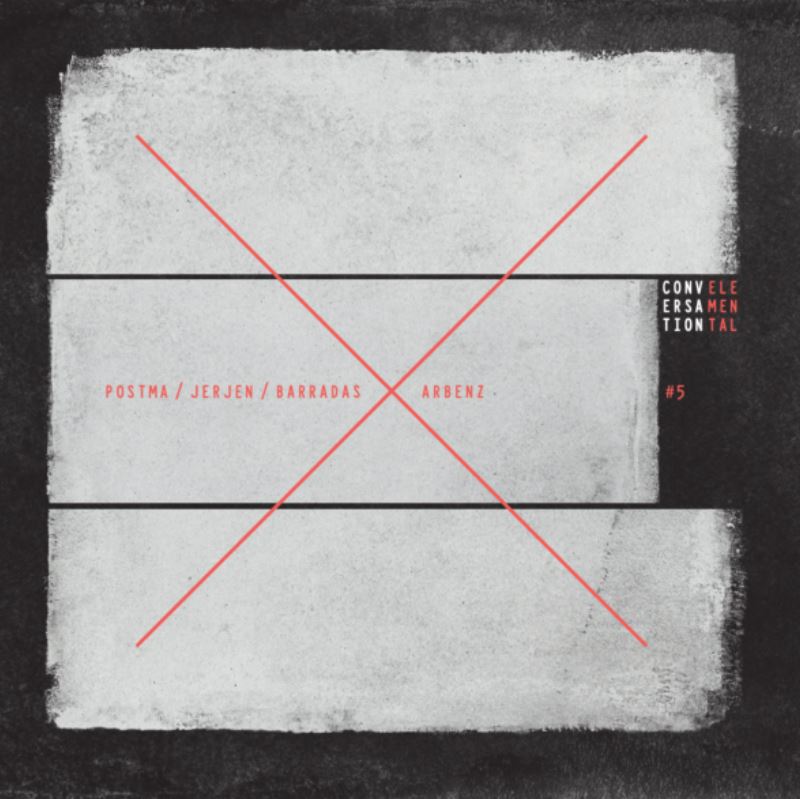
have a look for:
- Florian Arbenz Conversation 10
- Florian Arbenz Conversation 9 Targeted
- Florian Arbenz Conversation 8 Ablaze
- Florian Arbenz Conversation 6 und 7
- Florian Arbenz Conversation 5
- Florian Arbenz Conversation 4
- Florian Arbenz Conversation #2 und #3
- Florian Arbenz Conversation Condensed #1
- Florian Arbenz Groovy Vibraphon – Convergence
- Florian Arbenz drums

